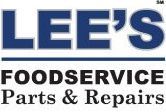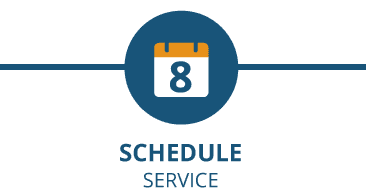Commercial Foodservice EquipmentRepair & Installation
Newsletter
Why it is Important to Properly Maintain Your Food Service Equipment
Working in the food service industry is a highly demanding and exacting profession. In order to succeed, you need to have reliable equipment to prepare food quickly and hygienically. Considering how busy you are, it can be difficult to find time to tune–up your equipment and get it properly serviced. But the benefits of making sure that happens are overwhelming. We wanted to make sure that all of our customers understood exactly why it’s important to get your food service equipment regularly serviced.
Fewer Repairs
One of the most important benefits to getting your food service equipment maintained is that it can potentially reduce the need for repair. You can’t plan for your oven, commercial range or refrigerator to break down, but you can plan on your maintenance technician showing up at a certain time each year to service your appliances. It’s much easier to be able to adjust your kitchen around a scheduled visit than it is to adjust on the fly for when your dishwasher won’t turn on.
In addition to that, when your technician visits your business, they could find developing problems and fix them before they actually cause problems.
Better Efficiency
As a business owner, you’re always thinking about the bottom line. The utility bills that you pay are a big part of your overhead and making sure that all your appliances are using as little energy as possible is a great way to keep your bills in check. When you get regular service for your food service equipment you could ensure that they’re operating as efficiently as possible.
Longer Life
Your commercial kitchen gets a ton of use every single day and all of your appliances take a ton of abuse. Every business owner wants to get as much service out of their equipment as possible before they have to replace it. Getting regular tune–ups and service for your equipment could help it last for a very long time.
Make sure that you call your local contractor for food service maintenance. They likely have a program that you can sign up for allowing them to schedule visits to your business so that you don’t have to. Their maintenance program may also give you access to discounted services.
Why You Should Replace Your Air Filters
Your heating and air conditioning systems are both vital to your home’s comfort throughout the year. Whether you’re looking to stay cool in the summer or if it’s time to heat your home in the winter, you need your AC and heater to work well. One of the most common (and easily avoidable) problems that we see is a clogged air filter. In order to protect the inside parts from large particles like dust and dirt, your HVAC system has an air filter in it, usually located near the return air duct. It needs to be changed regularly or it will clog and restrict the flow of air through the system. This can cause several serious problems for your home and we wanted to let our customers know about them.
Air Conditioning Problems from Clogged Air Filters
Your air conditioning system’s main job is to remove heat from your home and exhaust it outside. In order to do that, it uses a fan to pull in warm air from your home, then passes it over a series of very cold evaporator coils. The fan then pushes the newly–cooled air into your home through the ductwork. If the air filter gets clogged it will restrict the flow of air into the system and cause the following issues:
- Insufficient cooling
- Extra wear and tear
- Inefficient operation
- Reduced comfort
- Ice on the coils
- Strange noises
If you notice any of these issues with your system, the first thing you should do is check your air conditioning system’s air filter. Depending on the type of filter that you have, you may be able to wash it off and put it right back in. But most likely you will have to buy another filter.
Heating Problems from Clogged Air Filters
For heating systems, a clogged air filter can cause big problems—especially for furnaces. A burner in the furnace heats up the heat exchanger and a fan pulls in cool air from your home and passes it over the exchanger. If the filter is clogged it won’t allow enough cool air over the exchanger and it will heat up which could cause it to crack. A cracked heat exchanger can allow carbon monoxide to leak into your home which could be very dangerous.
Make sure that you get your heating and air conditioning systems regularly inspected and maintained by a professional. During regular maintenance visits, they will likely check the filter to make sure that it isn’t clogged or alert you if it is.
Ten Things You Can Do to Save Water
Conserving water in your home or business can be accomplished in a number of ways. While there are some more obvious methods used to save water, such as taking short showers or turning off the water while washing dishes in the sink, there are plenty of other ways to conserve water. Whether you own a home or a local business, you can easily save water and lower your utility bills simply by being aware.
Here are 10 ways to become more aware of your water usage and to conserve water:
Monitor Water Bills
Keep tabs on how much you typically spend on water bills. You can also contact your utility company and ask to see a yearly average for your home or office.
Repair Leaks
Even a small leak from a leaky faucet can waste a lot of water over time. Make sure you have a plumber repair any leaks in your home as soon as you notice them.
Install Low Flow Plumbing Fixtures
There are plenty of low flow plumbing fixtures on the market now. Replacing your old faucets with water–saving models could save up to 60% on water bills.
Toilet and Plumbing Appliance Upgrade
Toilets use up most of the water in a standard home. When you install a water–saving toilet, you could use 35% to 50% less water with each flush. There are also water–saving dishwashers and washing machines to reduce water usage.
Adjust Bathing Time
Taking shorter showers and turning off the water while shaving or brushing teeth will add up over time. Decreasing shower time even by a minute could save close to 150 gallons a month.
Use a Rain Barrel for Watering the Lawn
Rain barrels are easy to find or make on your own, and they are a great way to water your lawn or garden without running the garden hose for hours at a time. Watering early in the morning will also help to prevent immediate evaporation.
Use Online Water–Saving Calculators
By using an online water savings calculator, such as the one from Water Sense, you can get a general idea about how much water you could save by upgrading your plumbing equipment.
Only Do Laundry When There’s a Full Load
While you may want to wear that favorite shirt of yours tomorrow, it will save water to wait until there’s enough dirty laundry for a full load.
Compost Rather Than Using the Garbage Disposal
If you have the capability to compost at your home, try to throw food scraps onto the compost when you can. Even the little water used to run the garbage disposal will add up.
Cover Your Swimming Pool
If you own an outdoor swimming pool, try to keep it covered when you aren’t using it to prevent evaporation.
Contact the commercial foodservice & kitchen equipment repair and installation, and refrigeration repair and installation experts today at 1-800-728-1102
to find out how we can help you.
LET'S TALK TODAY, CALL US AT





